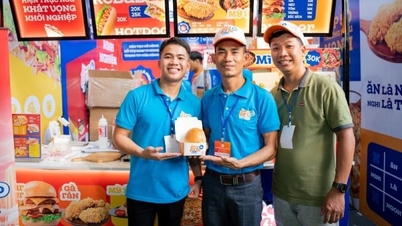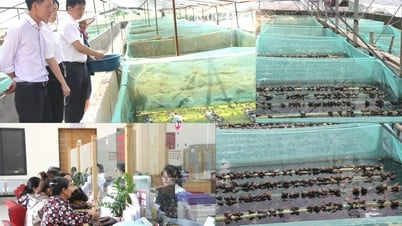Franchising is known as a typical choice of the F&B industry at home and abroad. However, besides the brands that have affirmed their names thanks to franchise chains, there are still many businesses that are not interested in this model.
The billion-dollar attraction of the F&B industry
According to a recent survey by Vietdata, Vietnamese consumers are increasing their spending on eating out by 5-10%. In fact, 14.9% of customers are willing to spend more than VND100,000 (about USD4) for dinner every day, 3.5 times higher than in 2022.
According to Kirin Capital's F&B Industry Outlook Report, the market value of the F&B industry in Vietnam in 2024 is expected to increase by 10.92% compared to 2023, reaching over VND 655,000 billion. To achieve this ideal number, businesses do not simply solve the "problem" of providing meals and drinks, but in fact require creativity, flexible management and operation to overcome challenges and competition in the market.
With such great appeal, the business trend of franchising is becoming more and more popular in Vietnam.
10 years since its inception, the Banh Mi Ma Hai brand is the largest franchised bread chain with about 1,000 franchise partners from North to South with a franchise price of 7.5 million VND.
Mr. Doan Van Minh Nhut - co-founder of this brand shared that the near-term goal is to expand the number of partners to 10,000. And the further goal is to bring the Vietnamese bread brand to the world through franchising.
Or most recently, the BAF Meat clean pork dealer model of SIBA Food is also looking for franchise business partners with the right to be provided with necessary equipment, supplies, furniture and a commitment to supply clean pork from the BAF Meat brand.
Franchising is also a deep penetration strategy of foreign enterprises for the "delicious cake" of F&B in Vietnam.
After 4 years of presence in Vietnam, GS25, a convenience store brand owned by GS Retail Korea, currently owns 200 stores, mainly concentrated in the Southern market such as Ho Chi Minh City, Binh Duong, Vung Tau and Dong Nai. Most recently, GS25 accelerated its chain expansion through franchising by cooperating with HDBank, the bank will support 1.6 billion VND/store for businesses receiving GS25 franchises.
With the franchise strategy, the brand is gradually realizing its goal - becoming the leading convenience store brand in Vietnam with more than 2,000 stores after 10 years of operation.
Or ranked 2nd in market share in Vietnam, after Pizza Hut with more than 50 stores. Currently, Domino's Pizza, through the franchise model and managed by Vietnam Food and Beverage Services Company Limited (VFBS), belongs to IPPG Group. Currently, Domino's Pizza has more than 50 stores in 9 provinces and cities across the country, serving nearly 10 million customers each year.
In April 2024, Domino's Pizza accelerated its coverage in Vietnam, when it appeared in Nha Trang, marking a strong step forward in the brand's plan to expand its market share in the Central region.
Choose to stay out of the franchise game
Besides the advantages, franchising still has limitations that make many businesses hesitate to use this form.
Mr. Le Thai Hoang, CEO of Thai Market, a chain of Thai restaurants in many provinces and cities across the country such as Ho Chi Minh City, Hanoi, Da Nang... said that for the development strategy of this brand, franchising is not the only way.
According to Mr. Hoang, he himself tried franchising but found it ineffective, so he decided to stay out of this "game".
“For a full-service restaurant like Thai Market, the menu is complicated and the management and operation of the processing and customer service are according to their own standards. It is complex, professional, meticulous and of high quality. Therefore, our franchise partners will have a hard time accepting the rules and operating principles,” Mr. Hoang shared.
Refusing to franchise, CEO Thai Market chose a growth strategy in terms of brand reputation and zoning. Specifically, Ho Chi Minh City was chosen as the place for concentrated development. In addition, it also aims to expand the brand, specifically the restaurant chains present in big cities such as Hanoi and Da Nang as at present.
Similarly, a brand that has been participating in the popular beverage segment since 2019, Rau Ma Mix, has still made a fortune even though it did not participate in franchising.
There are 60 specialized stores appearing in eye-catching locations of central cities of Ho Chi Minh City and Binh Duong, but the founder of Rau Ma Mix, Le Thanh Dat, has not decided to franchise the brand because the ingredients of gotu kola and fresh milk do not contain preservatives, so the shelf life is extremely short, especially some products only have a shelf life of the day.
Mr. Dat added that the production and logistics process from production to the arrival at Rau Ma Mix stores are strictly controlled, so not all partners have enough passion to operate effectively. Specifically, at Rau Ma Mix, after being processed in the central kitchen, the ingredients will be kept cold at a temperature of 0 - 5 degrees Celsius and transported to the stores by refrigerated trucks maintaining a temperature of 0 degrees Celsius.
“Big corporations in the F&B industry do not enter the pennywort market because they do not find it attractive enough and doing business with fresh ingredients requires more attention than with dry ingredients,” said the founder of Rau Ma Mix.
Source: https://baodautu.vn/doanh-nghiep-fb-khong-man-ma-voi-nhuong-quyen-thuong-hieu-d219440.html


![[Photo] Magical moment of double five-colored clouds on Ba Den mountain on the day of the Buddha's relic procession](https://vphoto.vietnam.vn/thumb/1200x675/vietnam/resource/IMAGE/2025/5/9/7a710556965c413397f9e38ac9708d2f)
![[Photo] Prime Minister Pham Minh Chinh chairs a special Government meeting on the arrangement of administrative units at all levels.](https://vphoto.vietnam.vn/thumb/1200x675/vietnam/resource/IMAGE/2025/5/9/6a22e6a997424870abfb39817bb9bb6c)





























































































Comment (0)